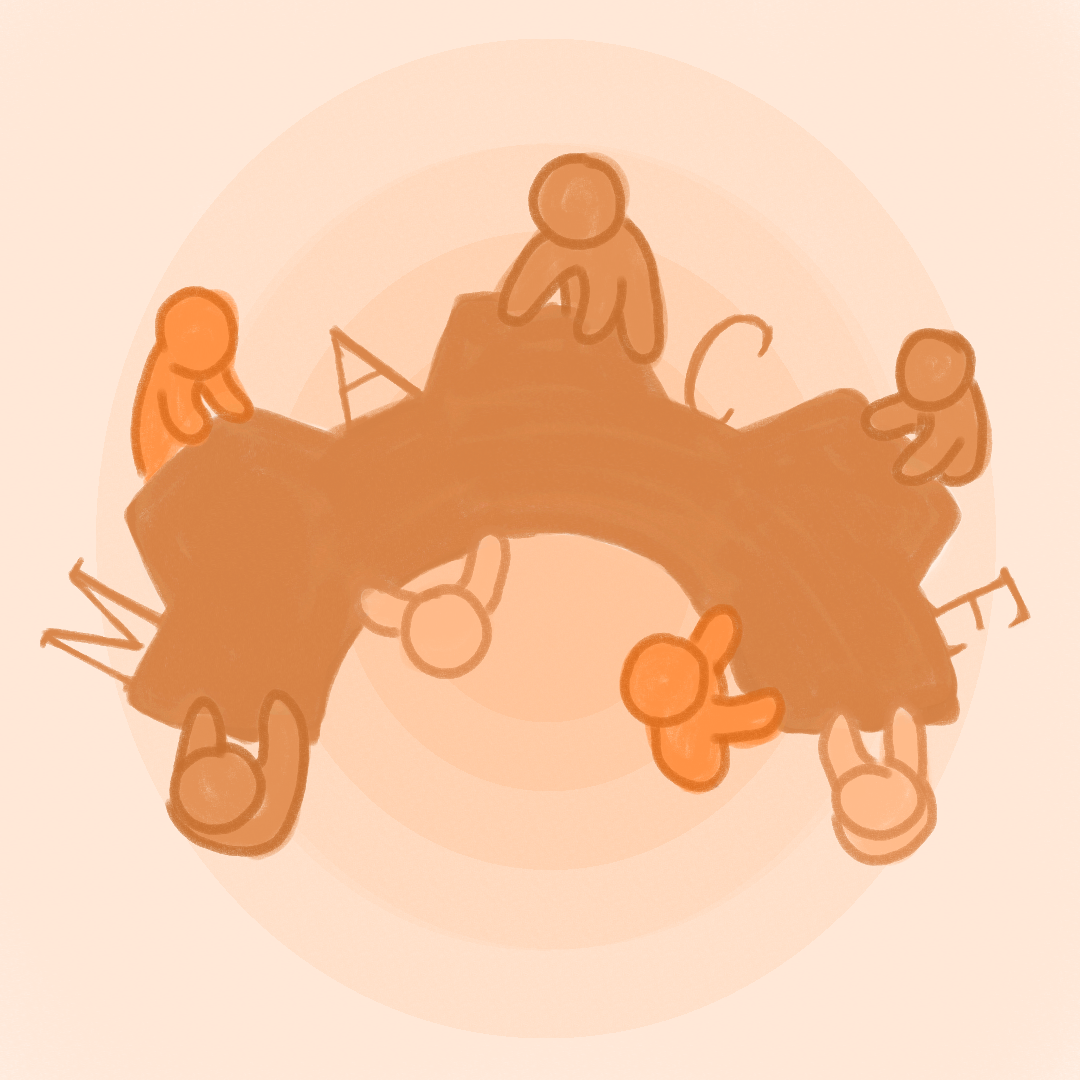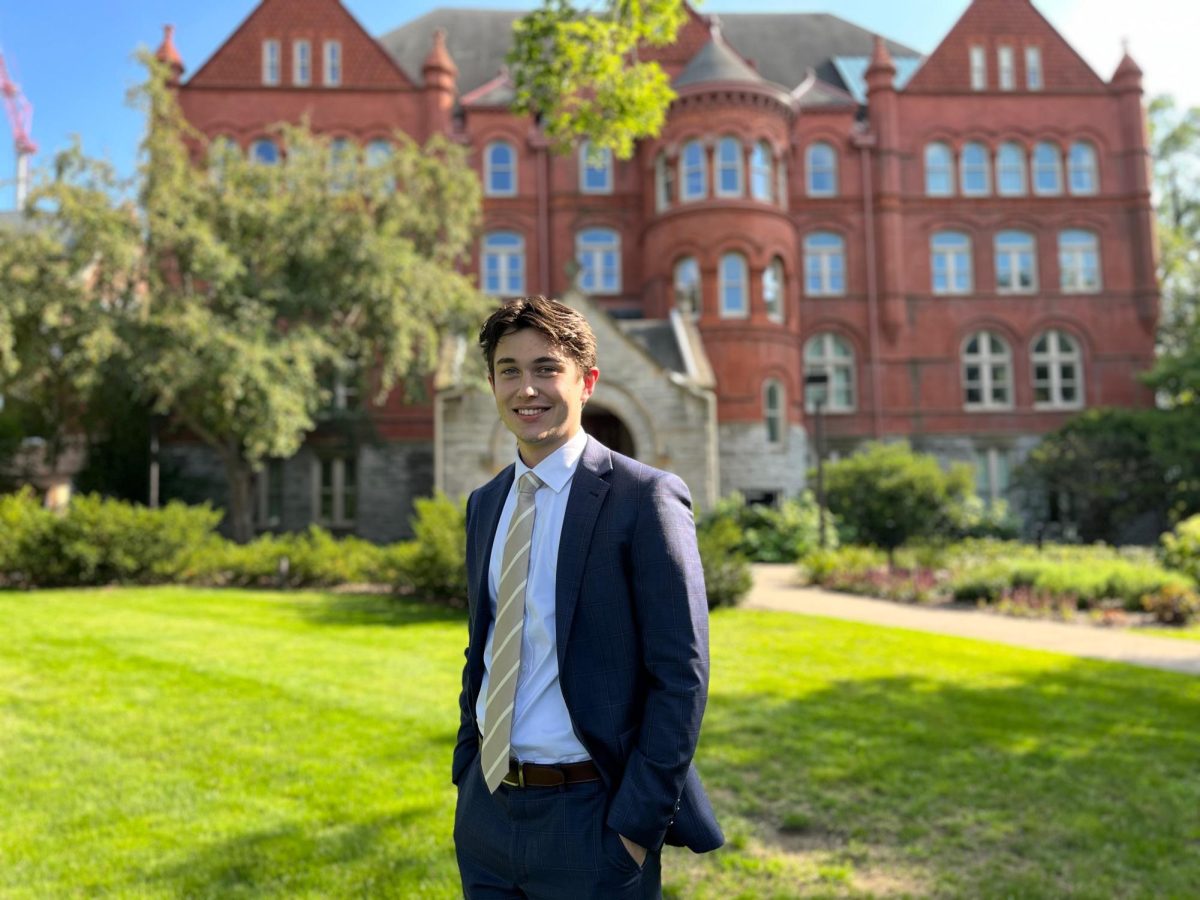On Tuesday Nov. 4, Noura Erakat, a Palestinian-American activist and legal scholar, spoke about her experience and work in the Middle East and participated in a discussion with Macalester students about issues regarding the Israeli-Palestinian conflict. Erakat came to Macalester through the Department of Multicultural Life’s SPEAK! series.
Erakat began by speaking of her personal history and how she relates to Israel and Palestine. Erakat’s family immigrated to the United States from Palestine after the Six-Day War, when Israel increased its power in Palestinian territories.Erakat traveled to and was educated in Israel as a college student.
“There were certain places that Palestinians were allowed only, or not allowed out of,” Erakat said. “There were certain parts of Jerusalem that I could travel to, as a US citizen, because I had a blue passport, that my cousins who were born in Palestine couldn’t.”
Erakat said she remembers her experiences in Palestine as somewhat of an awakening. Her background is incredibly meshed with the history of the Israeli-Palestinian conflict, which has been a struggle.
Erakat said she remembered wondering, “I’m Palestinian but I’m also American. Where do I place myself?”
Erakat briefly summarized the history of the Israeli-Palestinian conflict to provide context for further discussion. She stressed the fact that at the time of Israel’s establishment by the United Nations, the idea was that there would be no exclusives states.
“There would be homelands, but these would not exclude those who don’t necessarily belong, which contravenes current thinking about the two-state solution,” said Erakat.
Erakat also explained that “at the time of the establishment of Israel, Palestinians were regarded as non-people, in the sense of not being entitled to self-determination. From then on, Israelis and pioneers have been basing Israeli policy on two axis.”
She continued, “Firstly, the acquisition of the greatest amount of land with the least amount of people on it. Secondly, the least amount of land, with the greatest number of Palestinians concentrated on it.”
Erakat continued to explain that the way this conflict is framed for most people, by mass media, is that Israel’s establishment mirrors the way the United States declared its independence from British colonizers.
“We have this mythical history that these brave American pioneers emancipated themselves from the yolk of British colonialism and yet there is an indigenous population that is being ethnically cleansed in order for these settlers to take root,” Erakat said. “Israel’s history mirrors that narrative. Israelis free themselves from the yolk of British colonization in Palestine.”
Erakat explains how the creation of Israel coincided with a push to remove the Palestinian population along with its culture.
“Israel established itself and basically Palestinians are to be removed to meet the quota of Jewish majority population. They are to be marginalized. Their history is also to be removed,” Erakat said.
Erakat’s speech was followed by a question and answer session. A common question asked was one regarding the responsibility of American citizens and residents to show support and interest in the issue.
“Part of our responsibility is ownership of our settler history”, Erakat said. “As US taxpayers, we already are a part of the problem. The U.S. provides Israel $3.1 billion a year. That’s not counting forgivable loans and military aid.”
“Being a part of the problem means we also have to be a part of the solution,” Erakat argued. “Palestinians have asked for international solidarity to urge the institutions that we are a part of to boycott, sanction and divest Israel until it complies with human rights norms mainly in the areas of the end of colonization of Arab lands, equality for the Palestinian citizens and the right of return for Palestinian refugees. That gets us into the politics of solidarity.”
Students had several questions about details of the complex history of the Israeli-Palestinian conflict, and Erakat was keen on clarifying the intricacies of the situation.
She delved deeper into the issue of the right of return, specifying that the Palestinian refugee population today is 6.5 million people.
Erakat’s concluding thoughts reminded the audience to be wary when discussing the Israeli-Palestinian conflict.
“It’s important to remember this isn’t about mutually exclusive narratives,” Erakat said. “The rejection of Israeli settler colonialism is a rejection of bigotry at large, which includes a bigotry against Jewish people. There is no movement for Palestinian self-determination and there shouldn’t be that is mutually exclusive with the rights and the freedoms of Jewish people.”
Erakat continued on to say, “Even those today who are advocates of the one-state solution have not advocated for the removal of Jewish people because of an embrace of that history. [Palestinians are] saying that we can be neighbors, but you can’t be my master.”
Student reactions to the event were overall quite favorable to Erakat’s speech.
“I thought she did a really good job explaining things,” Kristen Tuttle ’18 said. “She did a good job of dissecting the issue to make sure we weren’t only looking at it through her perspective but that we understood the other side.”
“I think she did a great job of clearly voicing perspectives that can be called radical, controversial or confrontational in a way that was so clearly part of her convictions and her life experience,” said Celeste Robinson ’16, a Mac SUPER member.






Jennifer Rampling • Sep 8, 2019 at 3:50 am
thanks to the author for taking his clock time on this one.
KennethDella • Jul 25, 2019 at 1:17 pm
Привет всем участникам! класный у вас сайт!
Нашел класную базу кино: смотреть сериал сотня в хорошем качестве hd
Тут: фэнтези 2019 смотреть бесплатно в хорошем лучшие фильмы фэнтези онлайн 2018 список 2018
Тут: драмы смотреть онлайн в хорошем качестве http://inspacefilm.ru/drama/ список 2018
Здесь: смотреть документальные фильмы онлайн бесплатно хорошем качестве http://inspacefilm.ru/dokumentalnyy/ рейтинг 2019
Здесь: http://inspacefilm.ru/10407-fatih-fatih-sezon-1-2013.html Смотреть Фатих / Fatih (Сезон 1) (2013) онлайн бесплатно
Здесь: сериал Приключения Шерлока Холмса и доктора Ватсона: Собака Баскервилей 2 – Серия 7 онлайн Смотреть сериал Приключения Шерлока Холмса и доктора Ватсона: Собака Баскервилей 2 – Серия 7 онлайн бесплатно
Здесь: http://inspacefilm.ru/7514-vyshel-vtoroy-tizer-novyh-zvezdnyh-voyn-okinoua.html
Howardpaymn • Jul 25, 2019 at 1:17 pm
Привет всем! класный у вас сайт!
Нашел топ базу кино: хороший русский военный фильм смотреть онлайн http://kinovalenok.tv/
Тут: смотреть кино в хорошем качестве фэнтези кино онлайн бесплатно в хорошем качестве фэнтези рейтинг 2018
Тут: Лучшие драмы бесплатно смотреть русскую драму в хорошем качестве рейтинг 2018
Тут: Лучшие документальные фильмы смотреть онлайн http://kinovalenok.tv/dokumentalnyy/ список 2019
Здесь: http://kinovalenok.tv/6117-obyavleny-pobediteli-prestizhneyshey-kinopremii-bafta.html Объявлены победители престижнейшей кинопремии BAFTA
Здесь: http://kinovalenok.tv/2290-kolin-fert-natravit-robota-na-terroristov.html
Здесь: http://kinovalenok.tv/6413-sonka-zolotaya-ruchka-sezon-1-2007.html
BonnieDix • Jul 21, 2019 at 6:47 am
https://vk.com/public177998187 – Секс знакомства Уфа
https://vk.com/public177966843 – Секс знакомства Нижний Новгород
https://vk.com/public177999120 – Секс знакомства Пермь
https://vk.com/public177966620 – Секс знакомства Екатеринбург
https://vk.com/public177967301 – Секс знакомства Самара
https://vk.com/public178001483 – Секс знакомства Ижевск
https://vk.com/public177967052 – Секс знакомства Казань
https://vk.com/public177966401 – Секс знакомства Новосибирск
https://vk.com/public178000514 – Секс знакомства Краснодар
https://vk.com/public177966146 – Секс знакомства Санкт-Петербург
https://vk.com/public177968168 – Секс знакомства Тюмень
https://vk.com/public177967455 – Секс знакомства Челябинск
https://vk.com/public177967905 – Секс знакомства Ростов-на-Дону
https://vk.com/public177967748 – Секс знакомства Омск
https://vk.com/public177965909 – Секс знакомства Москва
https://vk.com/public177999570 – Секс знакомства Волгоград
https://vk.com/public177998675 – Секс знакомства Красноярск
https://vk.com/public178000062 – Секс знакомства Воронеж
https://vk.com/public177968290 – Секс знакомства Тольятти
https://vk.com/public178000995 – Секс знакомства Саратов
Секс знакомства Новосибирск
Секс знакомства Волгоград
Секс знакомства Нижний Новгород
Секс знакомства Казань
Секс знакомства Краснодар
Секс знакомства Тольятти
Секс знакомства Омск
Секс знакомства Самара
Секс знакомства Саратов
Секс знакомства Ростов-на-Дону
KevinDom • Jun 16, 2019 at 6:55 am
Приветствую!
Нашел познавательную информацию на этом сайте: http://limonos.ru :
добро gif http://limonos.ru/gifki-gif-animacii/
области науки http://limonos.ru/poznavatelnoe/
http://limonos.ru/1499-muzey-deneg-v-chikago.html Музей денег в Чикаго
Самая грустная кошка в мире Самая грустная кошка в мире
TommyPhype • Jun 2, 2019 at 8:02 am
Всем привет! интересный у вас сайт!
Нашел интересную инфу: эффективные диеты для быстрого похудения http://sportmanlife.ru/
Тут: быстро накачать пресс женщине быстро накачаться гантелями
Тут: гель rasputin реальные отзывы rasputin гель цена аптеках
Здесь: алкобарьер заказать бросил пить отзывы
Angeloxype • May 31, 2019 at 9:13 am
Здравствуйте! интересный у вас сайт!
Нашел прикольную базу кино: Лучшие мелодрамы бесплатно
Тут: смотреть лучшие семейные фильмы http://inspacefilm.ru/semeynyy/ список 2019
Здесь: лучшие фантастические сериалы онлайн бесплатно смотреть онлайн сериал коломбо в хорошем качестве рейтинг 2018
Здесь: смотреть лучшие триллеры hd качестве триллер бесплатно в хорошем качестве hd 720 рейтинг 2018
Здесь: http://inspacefilm.ru/9680-yunye-titany-teen-titans-sezon-1-5-2003-2007.html Смотреть Юные Титаны / Teen Titans (Сезон 1-5) (2003-2007) онлайн бесплатно
Тут: http://inspacefilm.ru/6045-sluh-maykla-fassbendera-zovut-v-spin-off-zvezdnyh-voyn.html
JimmyHed • May 25, 2019 at 9:48 pm
Приветствую! интересный у вас сайт!
Нашел интересную базу кино: лучшие российские сериалы бесплатно
Здесь: смотреть бесплатно лучшие семейные фильмы http://kinovalenok.tv/semeynyy/ рейтинг 2019
Здесь: смотреть сериал ленинград 46 в хорошем качестве http://kinovalenok.tv/serialy/ список 2018
Здесь: фильмы онлайн триллеры лучшие 2019 http://kinovalenok.tv/triller/ список 2019
Здесь: http://kinovalenok.tv/8180-ya-i-i-2015.html Смотреть Я / i / I (2015) онлайн бесплатно
Тут: http://kinovalenok.tv/9208-hbo-razmyshlyaet-nad-serialom-hraniteli-ot-zaka-snaydera.html
JasonvaX • Apr 19, 2019 at 4:42 am
Привет всем!
Нашел интересную подборку на этом сайте: http://limonos.ru :
день красивых девушек картинки красивые девушки года
скачать арт школа искусств
http://limonos.ru/2140-kak-v-lione-proshel-festival-sveta.html Как в Лионе прошел Фестиваль света
Самые свирепые морские динозавры Самые свирепые морские динозавры
http://limonos.ru/7112-kosmicheskiy-hram-tailanda-vat-phra-dhammakaya.html
MonicaElent • Apr 17, 2019 at 2:32 am
https://vk.com/public177968168 – бесплатный вирт секс бесплатно
[url=https://vk.com/public175040494]секс знакомства сейчас[/url]
bbzwaymn • Apr 13, 2019 at 10:01 am
В Сервисе вы можете купить МЕШАЛКИ, Отстойники для воды, Лопастные мешалки, Декантерные центрифуги, Технические колодцы, БиоБлок (ББ), Флокуляторы, ОДЪЕМНЫЕ УСТРОЙСТВА И МЕТАЛЛОКОНСТРУКЦИИ Шнеки для зерна и пищевой промышленности, ВОДООЧИСТНОЕ ОБОРУДОВАНИЕ Фильтры-ловушки, ПОДЪЕМНЫЕ УСТРОЙСТВА И МЕТАЛЛОКОНСТРУКЦИИ Вышки (сотовой связи в том числе), ОЧИСТКА ЛИВНЕВЫХ СТОЧНЫХ ВОД Нефтеуловитель, НАСОСНОЕ И КОМПРЕССОРНОЕ ОБОРУДОВАНИЕ (Грунфос, КСБ, Вило, КИТ, Взлёт, ТВП) Ротационно-поршневые насосы, ВОДОПОДГОТОВКУ Установки фильтрации и предподготовки, а также все для автомойки Автомойки на базе флотации.
У нас вы найдете ЛОС для промышленных предприятий, а также блок биологической загрузки ббз 65, мы можем произвести Земляные работы и прокладка труб. Бурение неглубоких скважин, Геологическое изучение недр, Водоснабжение частного дома.
В компании обслуживает скважины, производит Монтаж канализации.
дегидратор осадка и биозагрузка купить [url=https://bbzmos.ru]блоки биологической загрузки для очистных сооружений[/url]
waymn • Apr 4, 2019 at 9:35 pm
У нас проектирует, производит Канализацию в частном доме.
У нас для вас естьв продажу(услуги) ЁМКОСТНОЕ И РЕЗЕРВУАРНОЕ ОБОРУДОВАНИЕ, Силосы для хранения сыпучих продуктов, Рамные мешалки, Термическая сушка осадков сточных вод, Смотровые колодцы, БиоБлок (ББ), Скиммеры для очистки жидкости от нефтепродуктов, масел, жиров, ОДЪЕМНЫЕ УСТРОЙСТВА И МЕТАЛЛОКОНСТРУКЦИИ Модульные здания, ВОДООЧИСТНОЕ ОБОРУДОВАНИЕ Очистка ливневых сточных вод: жироуловители, пескоотделители, маслобензотделители, сорбционные фильтры, комбинированные песко-нефтеудалители (с сорбционным блоком и без), ПОДЪЕМНЫЕ УСТРОЙСТВА И МЕТАЛЛОКОНСТРУКЦИИ Металлоконструкции фермы, ОЧИСТКА ЛИВНЕВЫХ СТОЧНЫХ ВОД Пескоуловители тангенциальные с шнековой выгрузкой, НАСОСНОЕ И КОМПРЕССОРНОЕ ОБОРУДОВАНИЕ (Грунфос, КСБ, Вило, КИТ, Взлёт, ТВП) Аэраторы трубчатые, ВОДОПОДГОТОВКУ Обезжелезиватели и деманганаты, а также все для автомойки Автомойки на базе флотации.
У нас вы найдете Обслуживание очистных сооружений, а также Коллектора, мы можем произвести Насосы для скважин. Бурение артезианских скважин, Поиск полезных ископаемых, Водоснабжение частного дома.
Обслуживание скважин : [url=https://as-p.ru ] Обсадка труб скважин[/url]
Edgarvab • Mar 30, 2019 at 4:55 pm
Привет всем участникам! интересный у вас сайт!
Нашел хорошую инфу: https://zen.yandex.ru/media/energysmi/himiki-i-fiziki-vrut-byla-li-falsifikaciia-tablicy-mendeleeva-i-pochemu-iz-tablicy-iziali-element-efir-5c9dd90d6b73ff00b24e1a58